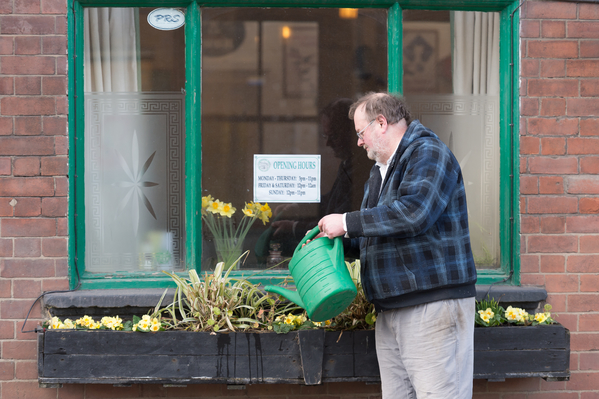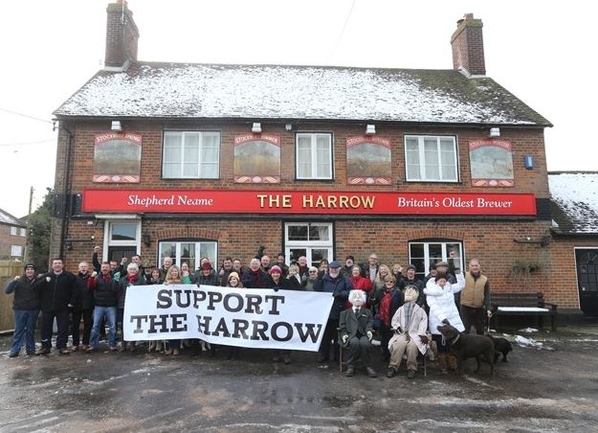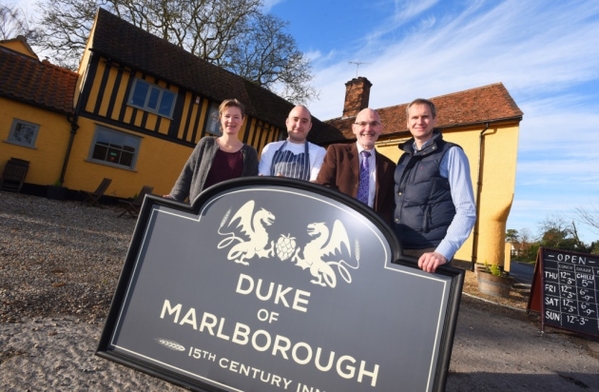Big drive to save embattled locals
Added: Tuesday, July 17th 2018

Pubs – vital community hubs – are being saved thanks to the work of organisations that pool resources under the banner of More Than a Pub, led by the Plunkett Foundation.
The annual conference of More Than a Pub in Sheffield, attended by more than 100 publicans and representatives of groups keen to save pubs, heard of the advice and funds available to buy and restore pubs, along with case histories of pubs saved by their communities.
James Alcock of the Plunkett Foundation, Kate Stewart of Power to Change and Carl Laughna, policy lead for Community Pubs at the Ministry of Housing, said there were more than 120 pubs throughout the country, in rural and urban areas, that had been saved and restored.
The Plunkett Foundation is working with 126 community groups that want to save their local pubs while 1,500 pubs are now protected as Assets of Community Value. ACV is a local authority listing that makes it difficult for pub owners and property companies to close and sell pubs over the heads of customers.
The conference was told of the variety of schemes that are available to support community groups. They include bursaries, grants, loans and mortgages that are backed by advice on dealing with the tax authorities. As an indication of the funds available, the conference heard that 17 community groups had raised more than £4 million to save their pubs.
The centrepiece of the conference was a detailed presentation by Mark Powell, who runs the Gardeners Rest pub in Neepsend, Sheffield. Neepsend is the 16th most disadvantaged area in Britain and Mark said it had lost its traditional industries of gas, steel and rail and as a result schools, pubs and shops had closed.
But the regeneration of the neighbouring Kelham Island district, the conversion of old industrial buildings into flats and the arrival of a local bakery and market are indications that Neepsend is now reviving.

Mark Powell (top picture, watering window boxes at the pub) said the Gardeners Rest dates from 1898 and is a much-loved base for community groups and individuals. The pub backs on to the River Don and was badly damaged by floods in 2009. It needed extensive work to save it and keep it open.
“We had to preserve an old pub that’s rooted in its community and also to support local people,” he said. “The pub has social value. In seven weeks we raised £¼ million, enough to buy the pub."
The money was raised through a community share offer, with the opportunity to pledge for shares on Crowdfunder. The Gardeners Rest Community Society was registered by the Financial Conduct Authority as a Community Benefit Society. As well as the Crowdfunder money, a bursary of £2,500 was also received that paid for an architectural survey, with plans for improvements and a promotional video. The community group also received a grant of £50,000 and a loan for the same sum under the More Than a Pub programme, which will have to be paid back over a seven-year period.
Mark Powell said the vision for the Gardeners Rest included:
*A traditional local pub serving real ale and a wide variety of alcoholic and non-alcoholic drinks.
*A music venue with live music three nights a week, including guest performers and jam sessions.
*An activity centre with bar billiards, a weekly quiz night and the opportunity for local groups to book the pub’s conservatory to pursue interests ranging from photography to chess and local history.
*A venue for local artists and photographers. There’s an art exhibition in the main bar.
*To offer peace and calm free from jukebox, fruit machines or canned music. A place to talk, read newspapers and books, and play board games.
*To have a garden full of surprises on the banks of the River Don.
Mark added that a key policy was to provide work for people with learning disabilities who would find it difficult to find jobs elsewhere. They are given training in cellar management and pulling pints.
The pub works closely with local brewers and Mark praised the support he received from the Sheffield Brewery that supplies its full range of beers, along with eight guest beers. The pub is now the Sheffield Brewery tap.
Alice Thornton, who leads the evaluation side of More Than a Pub, told the conference she had received 359 enquiries from groups that want to run their own pubs. 169 were viable proposals and 148 now have action plans. 100 have received bursaries and 43 have applied for loans
Mike Hughes who runs MJD Hughes, business and commercial property specialists, said many pubs failed due to the lack of a business plan.
“People running pubs have to understand employment law and the minimum wage,” he said. “Does the business plan create sufficient profit to pay wages and organise a relief manager?
“They have to choose between a tenant and manager. A tenant should make £20,000 a year and the level of rent must encourage a tenant to work hard. A tenancy can be preferable if a community doesn’t have the time to monitor a manager.
“A tenant may be the ideal candidate who has run a successful pub. You need skills with beer, wine, food and entertainment. Local knowledge of the market is important. You also need a good accountant who can keep an eye on the business and help rent reviews.”
The Plunkett Foundation presented more case studies of pubs that have been saved by their communities.
The New Inn in Norton Lindsey in Warwickshire was put up for sale in 2016 by Enterprise Inns. The pub is a historic landmark in the village and dates from 1750. The parish council had registered the New Inn as an Asset of Community Value and this gave locals time to form a group and raise the funds to buy the pub.
A total of £450,000 was needed and this was raised through a Crowd Funding campaign, with the support of Plunkett. Under the More Than a Pub programme, Key Fund provided a loan of £50,000 and a grant of £50,000. The group also received grants from Pub is the Hub and Warwick District Council.
The management committee is registered as a community benefit society, which has a one-member-one-vote basis.
In addition to its role as a pub, the New Inn now has a cafe and there are plans to open a village shop. There are also library facilities and plans to add a laundry and dry cleaning service.

The Craufurd Arms in the Gringer Hill district of Maidenhead in Berkshire was put on the market in 2016. The unusual name and spelling is the result of the pub being close to a private school for boys, Craufurd College. The pub is just one mile from the Golden Harp in Furze Platt that closed in 2012 and is now a Tesco convenience store.
It seemed the area was destined to lose its last pub if the Craufurd Arms closed but a community group was formed of regulars who registered the pub as an ACV with the borough council. The action group received support from the More Than a Pub programme and a £2,500 bursary that helped set up the Craufurd Arms Society.
A specialist adviser from the Plunkett Foundation reviewed the society’s application for a share offer, which was awarded in February 2017. As a result, the group became eligible for the Big Society Capital Match Fund of £100,000 from the Community Shares Company. Further funds were raised from investors and a grant and loan finance worth £70,000 from More Than a Pub. Co-operative & Community Finance provided an additional £93,000 as a secured loan.
The pub is a true social hub and plays a significant role in preventing loneliness and social isolation. The group works with the Campaign to End Loneliness and is now providing activities to reduce isolation. As well as morning drop-ins, a local autism group holds regular coffee mornings and social evenings at the pub.
The pub is a good venue for local activities and has received sustained support from the local branch of CAMRA: in 2017 the pub was voted runner-up in the campaign’s national Pub Saving Awards.
The next stage of the refurbishment at the Craufurd Arms will be to re-fit the kitchen so a permanent food offer can be introduced. Beers are supplied by Rebellion, West Berkshire and Windor & Eton breweries.
The Harrow in Stockbury, Kent, is a small traditional pub in a parish of some 700 people. It’s a rural community with many older residents who rely on village-based services. The pub is 200 years old and in recent years has had several owners, the latest being the large Kent brewer Shepherd Neame.
In 2016, when the brewery said it was putting the pub on the market for £130,000, a campaign group was set up and quickly won support from locals, who pledged just over £187,000 to buy community shares in the business.
The campaign group commissioned a survey to discover what villagers would want and need from the pub. The results showed a desire for good local food, reasonable prices, a cafe during the day, mid week lunches and a family room. More than half the responses were from people aged 56 and more, with 20 per cent over the age of 70. The results helped the group to formulate its business plan.
The group worked closely with the Plunkett Foundation and also won a commitment from Shepherd Neame that the Harrow would be sold to the group before other offers were considered.
The group became a Community Benefit Society and won an initial bursary of £2,500 that helped put together a successful application to the More Than a Pub programme. This led to a grant of £40,000 and a further £40,000 came from Co-operative & Community Finance. Initial acquisition and start-up costs were estimated to be in the region of £380,000.
The remaining finance was secured from shareholders who, in addition to purchasing shares to the tune of £187,000, were asked to loan at least £10,000 over three years for a return of 4 per cent per annum to be payable at the end of the term. This was a lower cost option than a commercial loan.
Most of the refurbishment work on the Harrow was carried out by volunteers and the transformation both of the pub and the upstairs accommodation was remarkable and helped to reduce costs.
Both locals and visitors to the historic church in the village can now enjoy refreshments in the pub. The elderly and the infirm, especially those in outlying parts of the village, benefit socially and nutritionally from the Harrow’s lunch club, especially when ½½½½combined with the use of the village minibus. Residents are collected and returned home, reducing their social isolation and keeping them in touch with what is happening in the village and the wider world.
The pub is a friendly drop-in centre for anyone who feels lonely or isolated or just needs to get out for a chat and see a friendly face. The lunch club ensures older people in the village have access to a hot and nutritious meal, which improves their health. By lunching in the company of friends and neighbours, their sense of well-being is enhanced.
Internet drop-in sessions benefit people who do not have access to many of the web-based services such as utilities, banking, hospital appointments and pensions. Access helps them to conduct business and to access benefits without having to go to the business premises or spend hours on the phone.
The Duke of Marlborough is a 500 year-old, Grade II-listed inn in the Suffolk village of Somersham, 5½ miles from Ipswich. The pub was a successful business but the owners were keen to retire and it ceased trading in December 2014. Sarah Causton (seen on the left in the picture with other members of the Save the Duke group), a local doctor was dismayed at the thought of losing the last pub in the village and she launched a Save the Duke campaign.
She says: “The Duke is a beautiful historic pub, a central feature of village life. We wanted it to stay that way. Quite simply, we refused to accept that 500 years of local hospitality should come to an end.”
As a result of the campaign, the pub was bought in March 2017 and re-opened in late spring that year. The steering group won help and guidance from the Plunkett Foundation and registered with the FCA as the Somersham Community Pub Ltd. Its aims included buying the pub and grounds, conducting a fast refurbishment to offer a warm welcome to diners and drinkers, provide a bigger trading area but to keep carbon footprints low, and to have a strong community focus.
The pub was valued at £300,000 and a crowd-funding campaign was launched. Grants were received from the county and parish councils and Suffolk Empowering Communities Fund.
The local community is predominantly rural, with 2,400 residents. Statistically vulnerable people make up 20-30 per cent of the community. There is a high level of unemployment, an ageing population and poor access to transport.
The society drew up a social impact plan that involves recruiting local volunteers to manage regular activities such as lunch clubs for the elderly, quiz nights for families and music evenings. Further plans include providing IT equipment and training sessions, speakers for talks and to organise a local minibus or cars in order that residents can visit the pub for a meal or a drink. The pub provides a venue for tackling loneliness and isolation.
Sarah Causton says: “People want a vibrant social hub serving fresh food and quality drinks from the region. By offering an enticing menu, creating a great atmosphere and putting on the right events, custom will be attracted from far and wide.”
*For further information and advice, call the Plunkett Foundation on 01993 810 730, email [email protected] or visit www.plunkett.co.uk.







